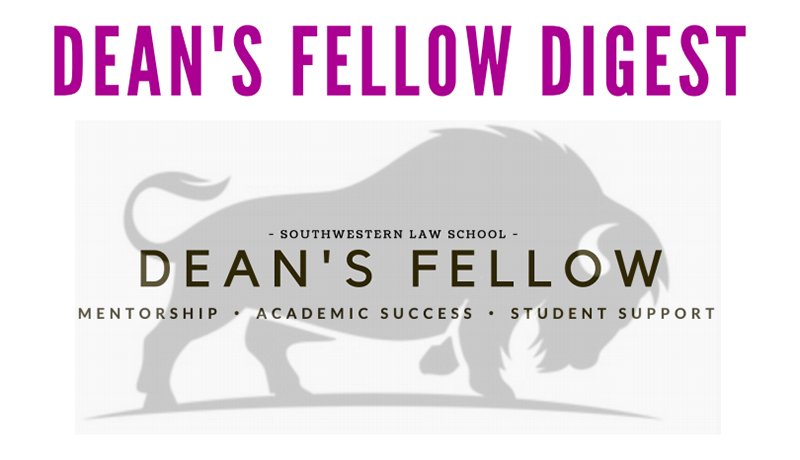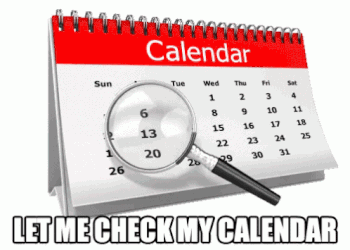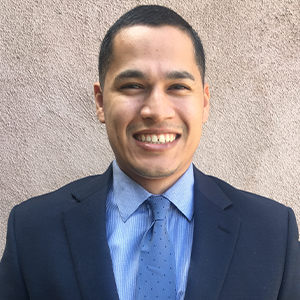SWLAW Blog | Dean's Fellow Digest

October 16, 2020
Dean's Fellow Digest Issue #18 - The [Uncalendared] Life is not Worth Living
Issue: 2020-10-16
Dean's Fellows consistently strive to support students in realizing their full academic potential, leading ultimately to success on the bar exam and in the workplace. To support all Southwestern students in this goal, the Dean's Fellows created this Digest as a way to check-in at critical times throughout the semester with helpful tips, strategies, and encouragement.
IN THIS ISSUE:
- The [Uncalendared] Life is not Worth Living
The [Uncalendared] Life is not Worth Living
By: Enrique Martinez*

“The unexamined life is not worth living.” - Socrates
I was on a metrobus to campus, back when I did not have a car. I had put forth so much effort toward studying for the final exam, and I had allotted enough time to get to campus early. When I got there, I immediately noticed a large group of students walking out of Westmoreland. For a split second, I was at a loss as to what was happening. Then I realized I had missed my final!
Calendaring is a Necessity
Students and lawyers alike must be able to effectively calendar future meetings, deadlines, and goals. Without this skill, you might as well pack your bags and save yourself the embarrassment of having to explain to your client—and to the State Bar—why their case was dismissed for not filing within the statute of limitations period.
It can be tough to grasp why calendaring requires separate attention and practice. The truth is that calendaring, like preparation, is a skill that will always require constant practice and dedication.
For example, you might find yourself at a summer internship needing to balance meetings and deadlines. If this is the case, then punctuality is an absolute requirement and deadlines should be met. Reminders should be inserted into your calendar and periodic check-ins should be scheduled to speak with your supervising attorney.
More specifically, if you’re in a civil litigation position then you already know that one simple discovery instrument like a deposition requires that “... lawyers and staff… accurately calculate and schedule certain events related to [the] deposition—such as when to send notices, serve subpoenas, prepare a deposition outline—in advance according to applicable rules.” [1]
Do What Works for You
Maybe you like to pencil in your deadlines, appointments, etc. on an agenda. Maybe you have a whiteboard on which you write your daily schedule. Maybe you prefer to input your schedule and deadlines on an Outlook or Google Calendar. Or, maybe you do all of the above!
 The point here is to do what works for you. There are advantages to every type of calendaring method. For example, I began using a 6x12 whiteboard I purchased from Family Dollar for $3. I use this whiteboard every day to set my daily schedule, and it works like a charm.
The point here is to do what works for you. There are advantages to every type of calendaring method. For example, I began using a 6x12 whiteboard I purchased from Family Dollar for $3. I use this whiteboard every day to set my daily schedule, and it works like a charm.
I think it’s also important add a bit of fun into your calendaring. You may decide to add in personal goals that are non-school related, such as workout routines, or use different colors to distinguish between different types of assignments.
For more tips and tricks, see this article: Madeleine Burry, Use a Calendar to Boost Your Productivity, Career Tool Belt, April 22, 2019.
Organization = Efficiency
As Walburg’s article explains, dividing your schoolwork into “... 30-minute sessions will help you retain information and decrease stressful studying.”[2] The reasoning behind this is simple. First, you have the benefit of stepping back to assess your entire workload. Now you can break down assignments to make them more manageable and allocate your time accordingly. Second, you will probably digest and retain information more efficiently by revisiting it with a fresh perspective multiple times. Lastly, if you start working more efficiently, then chances are you will be less stressed (and work even more efficiently).
For example, I instantly noticed the benefits of using my whiteboard within a couple of weeks. I found it increasingly easier to finish assignments on time. I also had more free time. Another interesting benefit was that I could get more done with significantly less stress.
Click here for even more tips and tricks.
Like Socrates said, “The unexamined life is not worth living.” It is better to set goals and make things happen for yourself than going through life merely doing as you are told and/or required to. So, I leave you with a slightly altered version of Socrates’ words: “The [uncalendared] life is not worth living.”

[1]Erez Bustan, Anxiety and Legal Calendaring in the Times of COVID-19, Law.com, May 05, 2020.
*About the Author:
ENRIQUE MARTINEZ
 Enrique is a Traditional Day 3L student who graduated from UCLA in 2015. Prior to law school, Enrique worked at an immigration law firm helping victims of crimes apply for U-Non-Immigrant Visas and he volunteered doing expungements at the Public Defender’s Office.
Enrique is a Traditional Day 3L student who graduated from UCLA in 2015. Prior to law school, Enrique worked at an immigration law firm helping victims of crimes apply for U-Non-Immigrant Visas and he volunteered doing expungements at the Public Defender’s Office.
Enrique has externed with AT&T in-house counsel and is doing another externship with the Alternate Public Defender’s Office this summer. He is particularly fond of Evidence, Trial Practice, Criminal Law, and Litigation in general. Enrique likes to play soccer recreationally in local leagues and he is an avid sports fan (including mixed martial arts, soccer, football, and basketball).
Southwestern Law School Dean's Fellows | Scheduling and Booking Website
Dean’s Fellows are upper-division students with strong academic skills who go through a rigorous application and training process. They are an integral part of the Academic Success and Bar Preparation Department. They are carefully selected based on their academic excellence and ability to teach other students best-practice study methods that will help them become acclimated to the study of law. Dean’s Fellows meet with students as academic mentors.
Please click HERE to make an appointment with a Dean's Fellow.